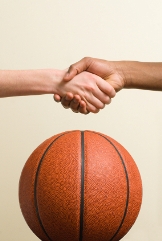In March of 2011, eight Compton High School students competed in a basketball free-throw contest, with first prize of $40,000 for college tuition and fees. Eighteen-year-old senior Allan Guei won the competition, but he made sure that the other seven classmates also left the court as winners. 
Court Crandall, a local advertising executive and screenwriter, created the contest because he wanted to film it for a documentary to help counter negative stereotypes associated with the city of Compton, which Sports Illustrated writer Jeff Benedict has called "one of the most gang-infested areas in America." It is also a poor city, with the Los Angeles Times reporting that more than two-thirds of the high school's students were eligible for subsidized lunches. Crandall hoped that his film, "Free Throw," would highlight "collaboration with the kids supporting each other" in the troubled city. He got a better outcome than he could have imagined.
The free-throw contest was open to all Compton students with grade-point averages of at least 3.0. Of the 80 students who qualified, Guei and seven others were selected at random to compete. A star point guard on the high school's varsity basketball team, Guei won the contest by sinking five out of ten free throws, one more than the first runner-up. He walked off with the $40,000 first prize and the other seven shooters each received $1,000. Or so it appeared.
Shortly after the contest, Guei won a full basketball scholarship to California State University at Northridge, so he no longer needed the prize money for his own tuition and expenses. Under National Collegiate Athletic Association (NCAA) rules, he could have kept nearly the entire prize for himself and his family without losing the scholarship. But, after discussing his options with his parents and coach, Guei chose instead to divide his entire prize among the seven runners-up, so that each would receive about an extra $5,500 to help finance their own college educations. Some would be the first members of their family to attend college.
"I've already been blessed with so much, and I know we're living in a bad economy," said Guei, whose parents are immigrants from the West African nation of Ivory Coast. "I know this money can really help my classmates," he told the Los Angeles Times. "They were all smart and wanted to pursue their dreams, but were having financial difficulties. I felt it was the right move to help the others, especially when everything else was taking off for me."
The Lasting Lessons: Empathy and Sports
During the finals of the 2008 National Basketball Association playoffs, the two coaches - the Los Angeles Lakers' Phil Jackson and the Boston Celtics' Doc Rivers - wrote an editorial in the San Jose Mercury News. The joint editorial did not concern the NBA or the playoffs. Knowing that they held the national (and indeed international) stage, the two coaches instead took a time-out to write about "the invaluable life lessons that sports can teach youth and high school athletes, such as resilience, empathy, teamwork, determination, confidence and the ability to overcome adversity."
Allan Guei's generosity tells a story of empathy, one of the six life lessons that Jackson and Rivers pinpointed. As President Obama said recently, empathy means "the ability to put ourselves in someone else's shoes." In To Kill a Mockingbird, lawyer Atticus Finch taught his young daughter that "you never really understand a person until you consider things from his point of view." Academy Award-winning actress Meryl Streep has said that "the power of empathy" is "the great gift of human beings."
Among competitive athletes, empathy does not encourage softness toward opponents or diminish the will to win. Indeed, empathy may even enhance that will. A few years ago, former Toronto Maple Leafs coach Pat Quinn praised hockey Hall-of-Famer and three-time Stanley Cup winner, Joe Nieuwendyk for having "that empathy that great leaders do. He knows how to help his teammates through tough times. " Nieuwendyk wanted to win every game he played in his 20-year NHL career, and Allan Guei wanted to win every game he played in youth basketball and high school.
Playing a team sport for years encouraged empathy, because cooperating with teammates likely led Allan Guei to sense the aspirations of the seven classmates who joined him at the free-throw line. Playing also provided him a special opportunity because, without basketball, he would never have been in a position to influence their lives.
Sources: Carla Rivera, "From a Standout Player, a Different Sort of Care Basket," L.A. Times, July 3, 2011; Jeff Benedict, "Straight Outta Compton: SI Writer Shares Story Behind the Story," Deseret Morning News (Salt Lake City, Utah), Dec. 1, 2007; Larry Gordon, "UCSD Reaches Out to Compton," L.A. Times, May 3, 2010, p. 1; Phil Jackson and Doc Rivers, "Winning Should Not Be the Coaches' Only Goal," San Jose (Calif.) Mercury News, June 12, 2008; Rick Matsumoto, "Nieuwendyk Turns Back the Clock," Toronto Star, Apr. 12, 2006, p. D2; http://www.youtube.com/watch?v=a112Lj_wFW8 (Allan Guei basketball game action; http://www.wdcw.com/work/project/139/compton_high_school_free_throw/ ("Free Throw" trailer).
Posted March 1, 2012








